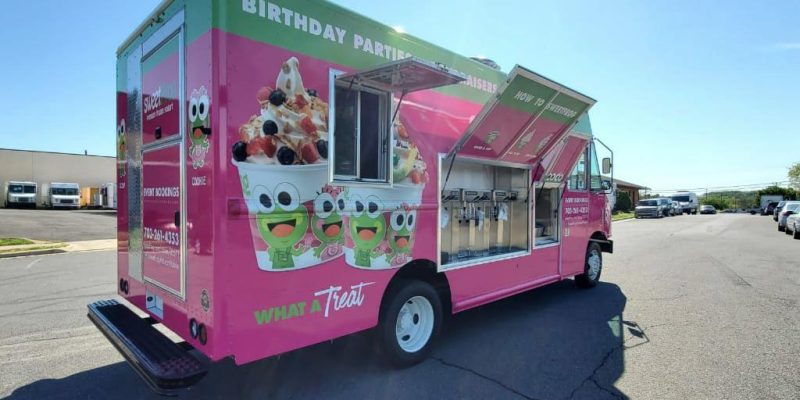The food truck industry faces unique challenges and opportunities throughout the year. Each season brings distinct conditions that affect menu items, foot traffic, operations, and marketing.
Whether you’re a food truck or trailer owner, we’ll help you understand and adapt to these changes, keeping your businesses thriving year-round.
– Challenges for Food Truck Businesses by Season –
Winter Months: Overcoming the Cold
- Reduced Foot Traffic: Colder weather discourages people from venturing outside, reducing customer turnout.
- Limited Events: Outdoor festivals and gatherings are scarce, resulting in fewer opportunities for food truck owners to showcase their offerings.
- Operational Issues: Freezing temperatures can cause equipment failures, increase maintenance needs, and create a tough working environment for staff.
Spring: Transitioning Through Change
- Unpredictable Weather: Rain and fluctuating temperatures can make outdoor dining less appealing.
- Menu Adjustments: Shifting from hearty winter offerings to lighter spring menu items involves trial and error.
- Event Competition: With festivals and markets returning, food trucks must compete for prime locations.
Summer: Navigating Peak Activity
- Excessive Heat: High temperatures can make outdoor dining uncomfortable for customers and create difficult working conditions inside trucks.
- Crowded Market: More food truck businesses are active in summer, leading to increased competition.
- Staffing Demands: Keeping up with peak-season foot traffic often strains staff resources.
Fall: Preparing for a Seasonal Slowdown
- Declining Events: Outdoor activities begin to taper off, leading to fewer crowds.
- Changing Customer Preferences: Patrons begin seeking warm, hearty seasonal menu items.
- Shorter Days: Earlier sunsets can reduce foot traffic, especially for evening services.
– Opportunities for Food Truck Growth by Season –
Winter: Innovate and Connect
Winter offers opportunities for creativity and community building:
- Seasonal Menus: Introduce hearty soups, stews, and hot beverages like spiced cider to draw customers seeking warmth. Highlighting these winter food truck offerings on social media can increase visibility.
- Focus on Online Presence: Use the time for food truck businesses to improve online ordering options and optimize their online presence. Share behind-the-scenes preparation of winter dishes and engage followers with promotions.
- Collaborate with Local Businesses: Partner with local coffee shops or breweries for joint discounts, helping both businesses attract customers during the colder months.
Learn even more: Mastering the Food Truck Market During the Off Season
Spring: Renew and Expand
Spring is an ideal time for food truck businesses to reconnect with their audience:
- Declining Events: Outdoor activities begin to taper off, leading to fewer crowds.
- Changing Customer Preferences: Patrons begin seeking warm, hearty seasonal menu items.
- Shorter Days: Earlier sunsets can reduce foot traffic, especially for evening services.
Summer: Maximize Revenue
Summer is the busiest and most profitable season for food truck businesses:
- Catering to Outdoor Events: Position trucks at fairs, concerts, and parks where large crowds gather.
- Offer Cooling Options: Include refreshing menu items like chilled drinks, ice-based desserts, and light wraps to cater to the season’s preferences.
- Loyalty Programs: Reward frequent visitors with discounts or free items to encourage repeat business.
Learn even more: How to Launch a Successful Food Truck in a Competitive Market
Fall: Prepare for Transition
Fall offers a chance to strengthen community ties while preparing for winter:
- Seasonal Flavors: Embrace autumn with dishes featuring pumpkin, cinnamon, or apple. Comforting seasonal menu items help keep customers engaged.
- Holiday Events: Position your truck at Halloween or Thanksgiving-themed events to maintain visibility and attract family-oriented crowds.
- Long-Term Planning: Use this time to conduct maintenance, train staff, and develop strategies for winter.
Maximizing Year-Round Success
Seasonal changes have a profound impact on the food truck industry, shaping menu items, operational strategies, and customer behavior.
By understanding the unique challenges and opportunities of each season, food truck owners can adapt to meet customer expectations, leverage local events, and optimize their business practices.
Whether it’s creating a cozy winter menu, refreshing spring offerings, summer loyalty programs, or comforting fall specials, flexibility and innovation are essential.
With strategic planning, the food truck business can thrive throughout the year, turning every season into an opportunity for growth and success.

